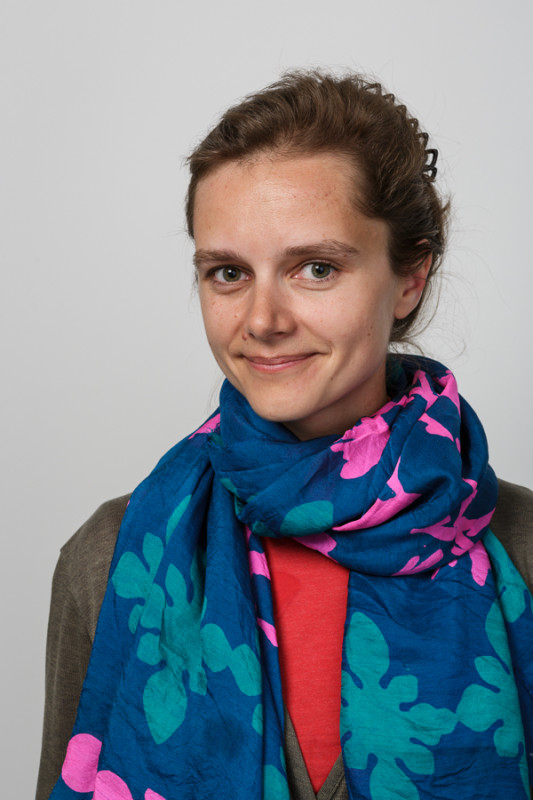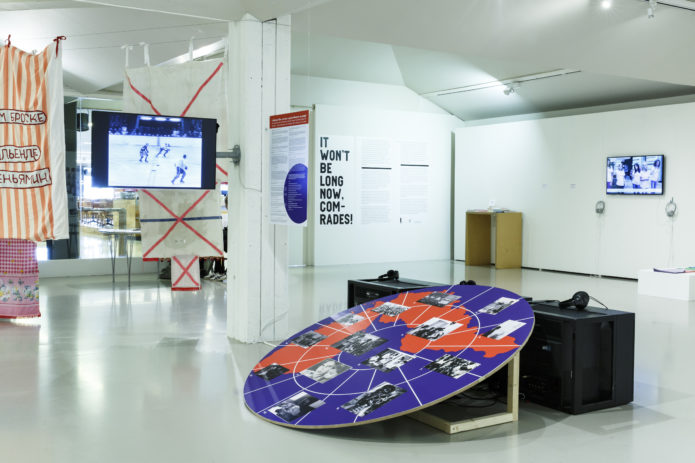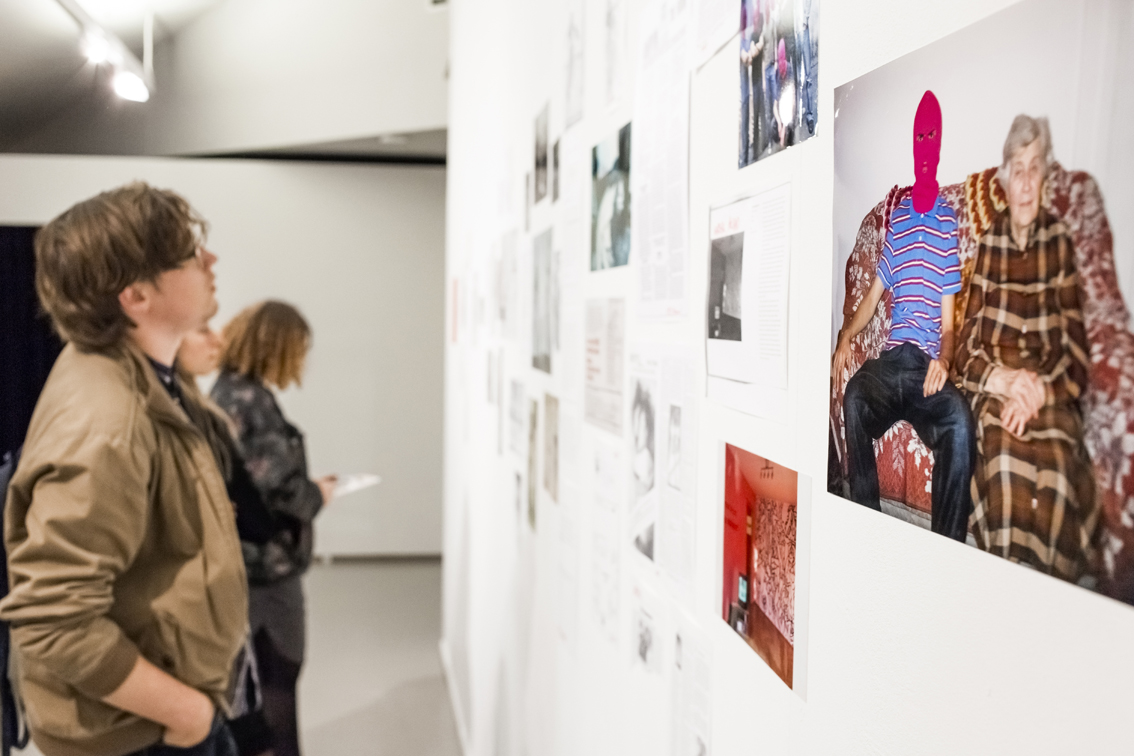 Visitors at the opening of It Won't Be Long Now, Comrades! Photo: Marlise Steeman.
Visitors at the opening of It Won't Be Long Now, Comrades! Photo: Marlise Steeman. Exhibition review: It Won't Be Long Now, Comrades!
The group exhibition at Framer Framed It Won’t Be Long Now, Comrades! (2018) displays the works of thirteen contemporary artists from the former Eastern European Bloc, addressing a wide variety of issues present in the current realities of the region. The exhibition coincides with the centenary of the Great October Socialist Revolution in Russia, and focuses on a perception of the concept of ‘revolution’ as a bottom-up form of resistance. By emphasising the urgency of a political turn from below, it engages with an idea of self-organisation and emancipatory thinking that could contribute to the resistance of the current state of dominant power and political hegemony.
As the curators Katia Krupennikova and Inga Lāce state, It Won’t Be Long Now, Comrades! is not about revolution, but rather about the potentiality of resistance which can be originated by people who are able to engender transformation and political change; as, in order for the governments to implement any reform, people need to act and respond. By displaying works that reflect on key points within the communist history of Eastern European countries, the curators focus on the current socio-political state, allowing the audience to critically engage with the idea of possible alternatives to present-day realities. In their opinion, the urgent need for a ‘counterforce’ can be found within groups that face structural oppression on an everyday basis.
In this regard, besides the artistic projects that directly refer to the concept of ‘revolution’ engaging with the protests in Russia, Ukraine and Armenia in recent years (such as the works of Gluklya, Nikita Kadan and Tigran Khachatryan), the show exhibits artworks incorporating topics such as racism, feminism and queer resistance, exploring the ‘revolutionary’ potential of these struggles.
The importance of the discourse on feminism as a way of looking at the past to understand the prospects of the present is addressed in the work of Marge Monko, I don’t want a baby. In order to depict how the age of the ‘new woman’ was constituted in the context of the Soviet Union – the woman who builds up the new society of equality and classlessness –, the artist uses fashion designs from 1925 and a text from Tretiakov’s play of the same name, which narrates the story of an unmarried political activist who decides to have a child on her own. This look at the early beginning of the Soviet Union – and at the Soviet Avant-garde, characteristic in its extreme emancipatory character – implies issues that are relevant to our contemporary world, such as female fertility and reproduction; and is taken up by the curators to address the present.

It Won’t Be Long Now, Comrades! at Framer Framed (2017), MARGE MONKO – I (Don’t) Want a Baby (2017). Photo © Eva Broekema
An important perspective is suggested in the work QAI/Revolution by Karol Radziszewski, who presents a 100–year timeline of queer resistance, displaying materials – photos and collages – from the Queer Archives Institute. This institute was founded by the artist in 2015, and although it operates internationally, it is dedicated to research and collection of queer archives focused on Central and Eastern Europe. The work includes materials from the first gay exhibition in Poland, which Radzieszewski organised in 2005; and various issues of DIK Fagazine – an artistic magazine focused on topics of homosexuality – founded in 2015 and published ever since by the artist himself.
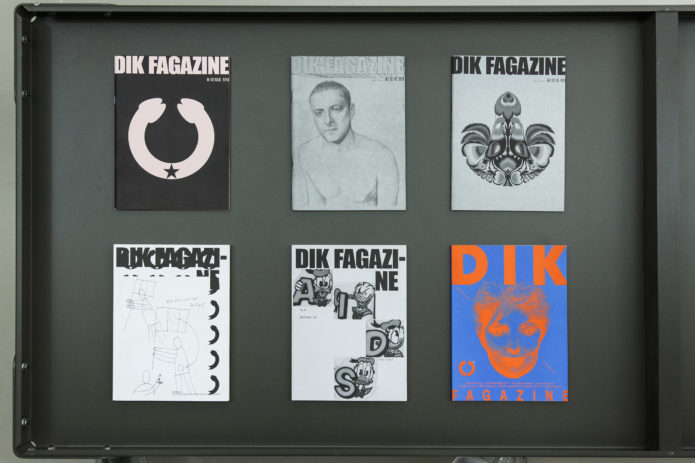
It Won’t Be Long Now, Comrades! at Framer Framed (2017), Karol Radziszewski – past issues of DIK Fagazine, part of QAI/Revolution (2017). Photo © Eva Broekema
Discussions on racism and identity are also present in the exhibition’s display, with works such as the four-video installation Biafra of Spirit by Tereza Stejskalova. Of this installation, one particular video attracts attention: a documentary named Black and White, and directed by Krishma Vishwanath. Vishwanath was an Indian student who studied filmmaking in Czechoslovakia in the ‘60s, when a wave of migrants from the Non- Aligned Movement moved to the country as a result of the politics of ideological internationalism. The film Black and White explores, almost from an anthropological viewpoint, the traditions of the Czechoslovakian society, and presents the reverse perspective of cultural otherness. This work challenges the audience to speak about migration in Eastern and Central Europe and in broader regions today; posing questions on migration, racism, identity, and acceptance.
Beyond this, It Won’t Be Long Now, Comrades! engages with further issues existing in both former East and West, albeit on different scales. In this respect, it is interesting to observe the reflections of participating artworks that reveal the hybrid forms of ideological identification both with and against socialism, theorising on citizenship and the dichotomy of public/private space. Throughout the history of post-communist countries, a denial of the concept of the social can be discerned due to its imposition. However, attitudes towards this idea diverge within the boundaries of the former Eastern Bloc. One such example is the political stance of the countries of the former Yugoslavia. The work of the Croatian artist Andreja Kuluncic explores the possibilities of self-organisation of factory workers by presenting interviews with people who participated in various protests for worker’s rights in the years after ’89, when the abolishment of the factories took place. In this way the work stimulates the viewers to think of modes of resistance to global capitalism.
By employing a post-communist discourse, Framer Framed and the curators of It Won’t Be Long Now, Comrades! enrich the postcolonial discussion by situating colonialism in the context of other systems of domination and appropriation, questioning the stereotyped image of the Eastern European region. Through contemporary art practices, which operate on a different level from any political system engendering critical thought, It Won’t Be Long Now, Comrades! explores urgent topics related to geopolitical situations crossing the borders of East and West, while also advocating for thinking of our present possibilities for political change. With a gaze towards the past, the exhibition reflects upon the current state of neoliberalism and capitalism, and asks how we could establish ‘hopeful socio-political realities’ in present-day conditions. Perhaps It Is Now A Matter of Learning Hope, as Irina Bucan implies through her video performance that takes place in an unfinished architectural project from Nicolae Ceausescu’s dictatorship; where the artist cites texts from the utopias of Bloch, More, and Marx, and raises one’s reflection and hope.
Iva Buzhashka
Art and Activism /
Exhibitions
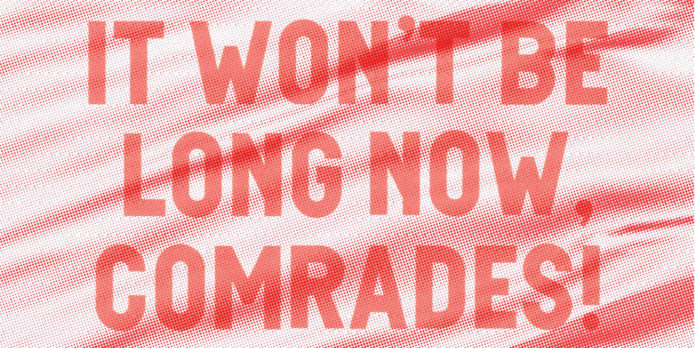
Exhibition: It Won't Be Long Now, Comrades!
Curated by Inga Lāce en Katia Krupennikova
Network
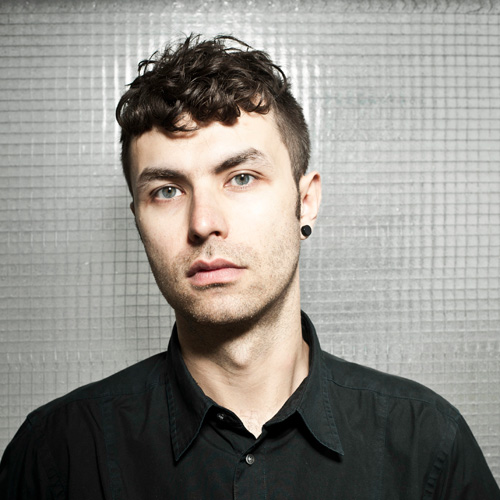
Karol Radziszewski
Artist
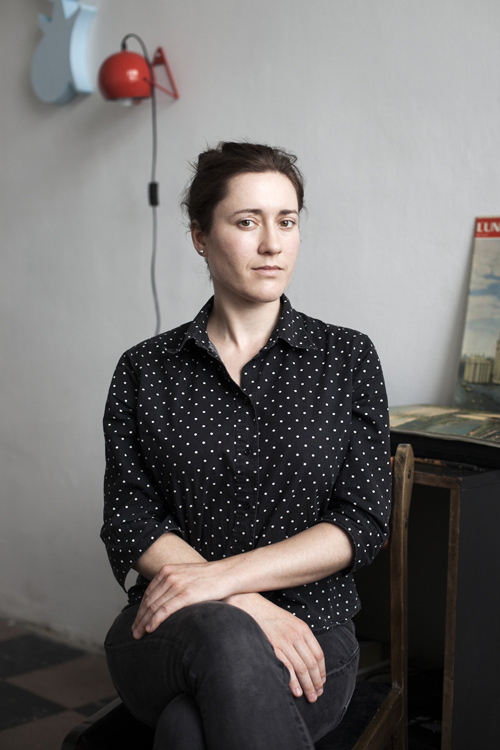
Agnieszka Piksa
Artist
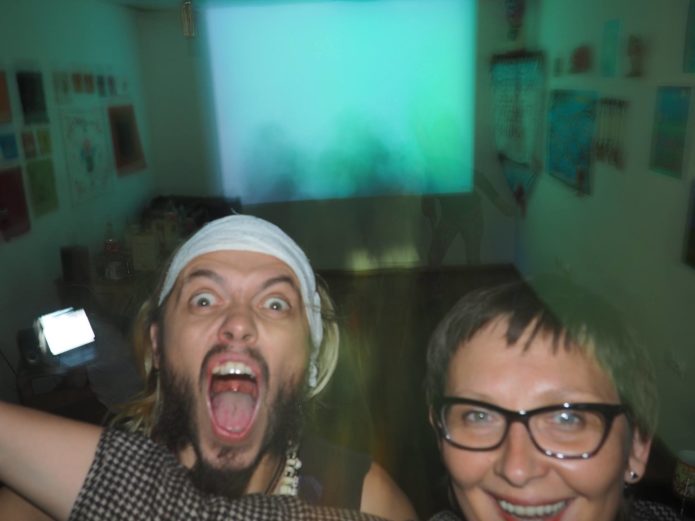
Nikolay Oleynikov
Artist
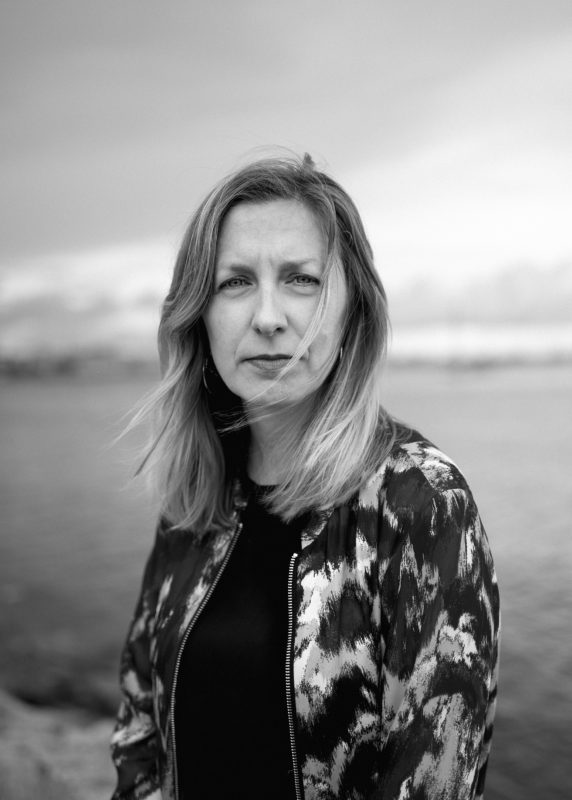
Marge Monko
Artist
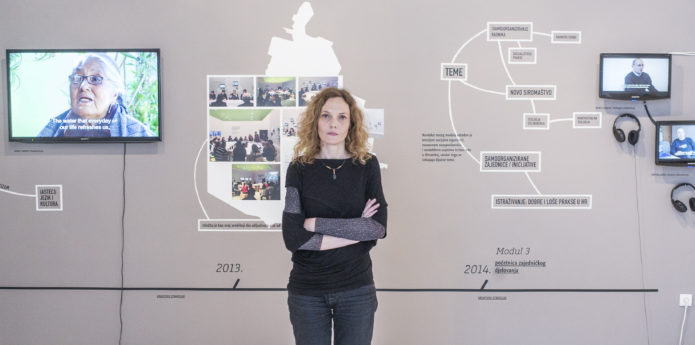
Andreja Kulunčić
Artist
Tigran Khachatryan
Artist
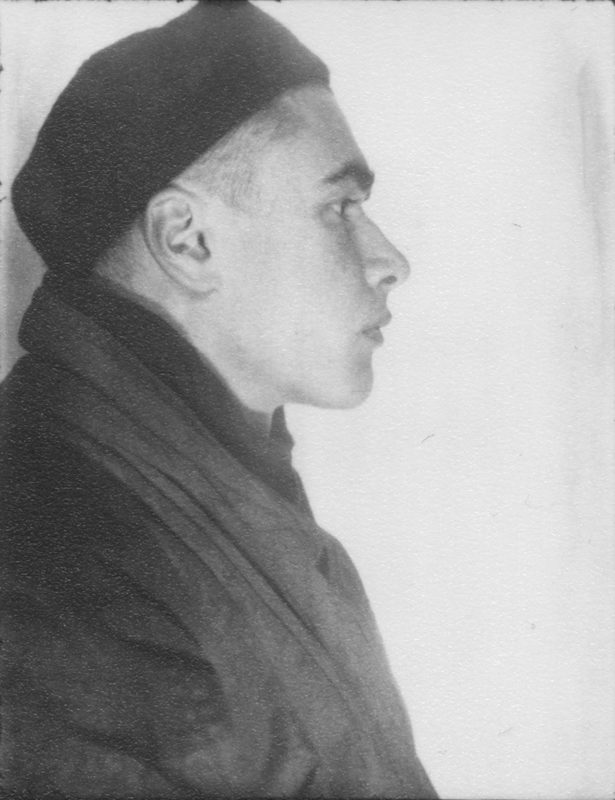
Nikita Kadan
Artist

Gluklya aka Natalia Pershina-Yakimanskaya
Artist
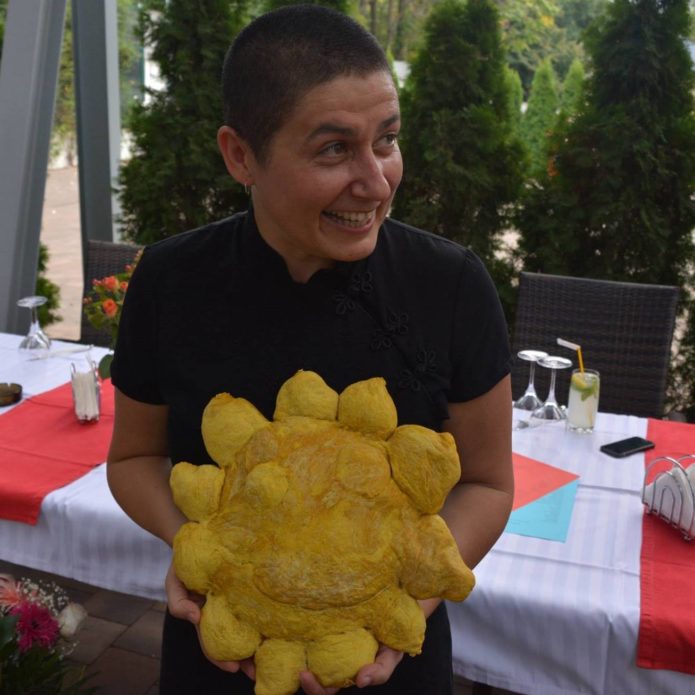
Irina Bucan
Artist
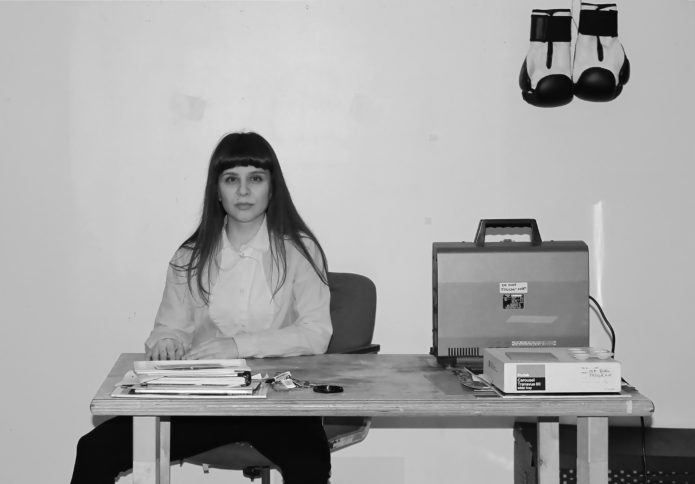
Željka Blakšić aka Gita Blak
Artist
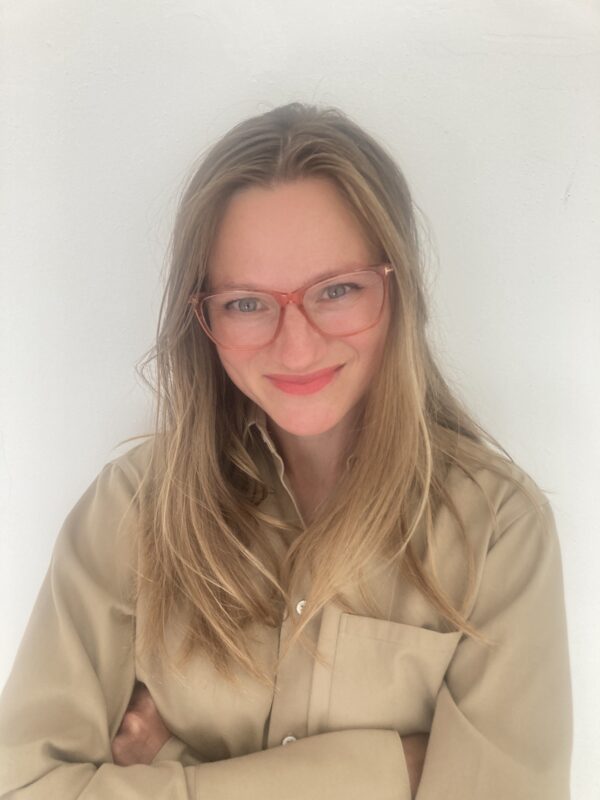
Katia Krupennikova
Curator
